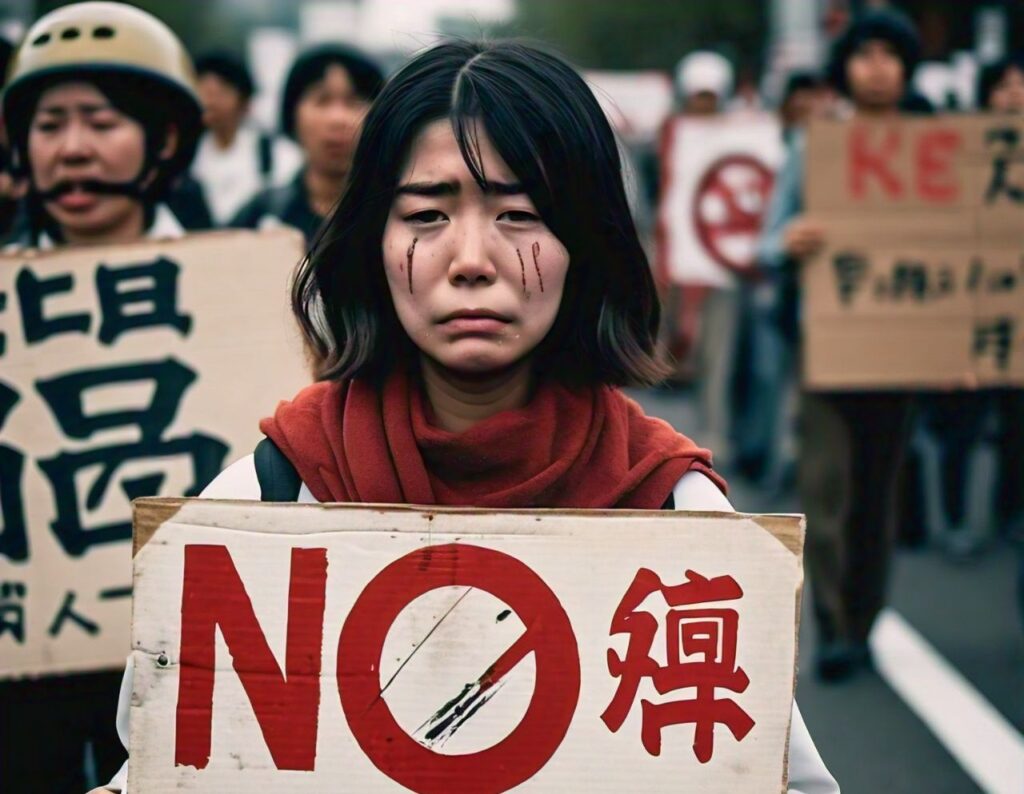Rising Tensions: US Military Crimes in Japan
Explore the rising tensions between the US and Japan over recent military misconduct. Learn about the internal and external challenges Japan faces and the steps needed to restore trust and security in the US-Japan alliance.”

"A young Japanese girl sheds tears while protesters in the background demonstrate against military misconduct."
Context
The Japanese government has recently taken a bold step by publicly addressing a disturbing trend: the increasing number of US military crimes in Japan, particularly sexual assault cases involving American soldiers stationed there. This situation is straining the long-standing US-Japan alliance, a relationship critical for Japan’s security, especially given threats from North Korea, China, and Russia.
A Troubling Pattern
According to Japanese officials, there have been at least five reported cases of sexual assault by US military personnel in recent times. Historically, over the past 25-30 years, more than 150 such incidents have been documented. These incidents have not only sparked outrage in Japan but have also brought to light the complex dynamics of the US military presence in the region.
Economic Burden
Adding to the tension is the financial aspect. In 2019, then-President Donald Trump demanded that Japan contribute $8 billion annually for the continued presence of US troops on its soil. This demand was met with shock and dismay in Japan, which is already grappling with these troubling incidents involving US soldiers.
Internal Challenges in Japan
Japan faces significant internal challenges. Despite the growing security threats, the Japanese youth are largely disinterested in joining the military. This apathy is partly due to the country’s aging population and the younger generation’s focus on cultural pursuits like anime and K-pop. Consequently, Japan struggles to bolster its military capabilities independently, making the US presence crucial yet problematic.
External Threats
Japan’s security concerns are manifold. The ongoing disputes with China over the East China Sea, North Korea’s missile tests, and territorial issues with Russia over the Kuril Islands compound the nation’s vulnerabilities. These external threats underscore the importance of a strong and reliable military alliance with the United States.
Public Outcry and Government Action
The Japanese government has now decided to address these issues head-on. Officials are no longer keeping these incidents from the public eye, acknowledging the need for transparency and accountability. The recent surge in public protests highlights the growing frustration and demand for change.
The Role of the United States
For the United States, this situation requires immediate and thoughtful intervention. Firstly, addressing the criminal behavior of American soldiers is paramount. The US military must implement stricter measures to prevent such incidents and ensure that those responsible are held accountable.
Secondly, diplomatic efforts should focus on rebuilding trust and supporting Japan’s security needs without exacerbating financial or social tensions. This might involve revisiting financial agreements and exploring more balanced contributions that do not burden Japan excessively.
Conclusion
The US-Japan alliance is at a critical juncture. Both nations must navigate these challenges with sensitivity and mutual respect. By addressing the misconduct within its ranks and reassessing its financial demands, the United States can help restore faith in its commitment to Japan’s security and foster a more robust, equitable partnership.
This situation highlights the complex interplay between military presence, economic obligations, and societal dynamics, reminding us that international alliances require constant vigilance and adaptation to remain effective and just.





1 thought on “Rising Tensions: US Military Crimes in Japan”